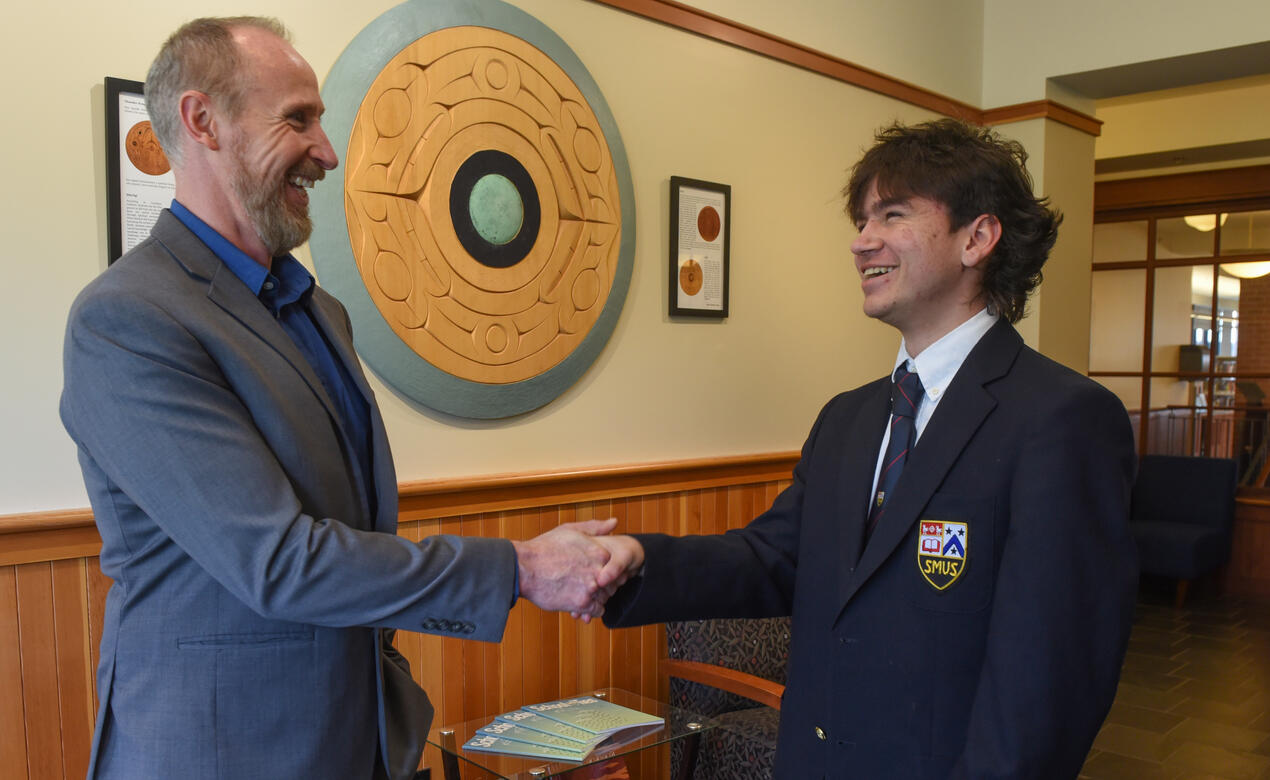
Kingcome Inlet is home to the Dzawada̱ʼenux̱w First Nation, a community of 60 people on the flowing Gwa'yi (Kingcome) River along the British Columbia coast. “The boat ride into the community is my favourite part, having trees on both sides, and mountains in every direction… it’s really beautiful,” Grade 11 boarding student Alessandro Raniolo reflects fondly. From the SMUS Senior School campus, the trip home takes 31 hours, including taxis, connector buses, float planes, boats, and more. Although the commute might appear extreme, traveling from the community to Vancouver Island for education is a common feat for Dzawada̱ʼenux̱w youth – one that Alessandro is intent on changing.
As the latest recipient of the Indigenous Peoples Within Canada Award, Alessandro was offered a boarding scholarship to attend SMUS. “It’s a step in the right direction to encouraging Indigenous students to pursue higher education. I want other youth interested in applying for this award to know that you shouldn’t be scared to apply because you’re Indigenous. The point of the award is so that Indigenous students can have an equal playing ground to educate themselves and learn, in a healthy environment. I know that attending SMUS will help me go to university so that I can achieve my end goal of opening up a cultural boarding school, so that students don’t have to leave our community to continue their secondary education.”
Seeking a Supportive Challenge
Back home, the school only provides education up to Grade 7, requiring students -and often their families- to leave the community in order to continue their schooling, most commonly on Vancouver Island. Alessandro tried online school for Grade 9 during the height of the pandemic, but found that he needed the social interaction of being around people.
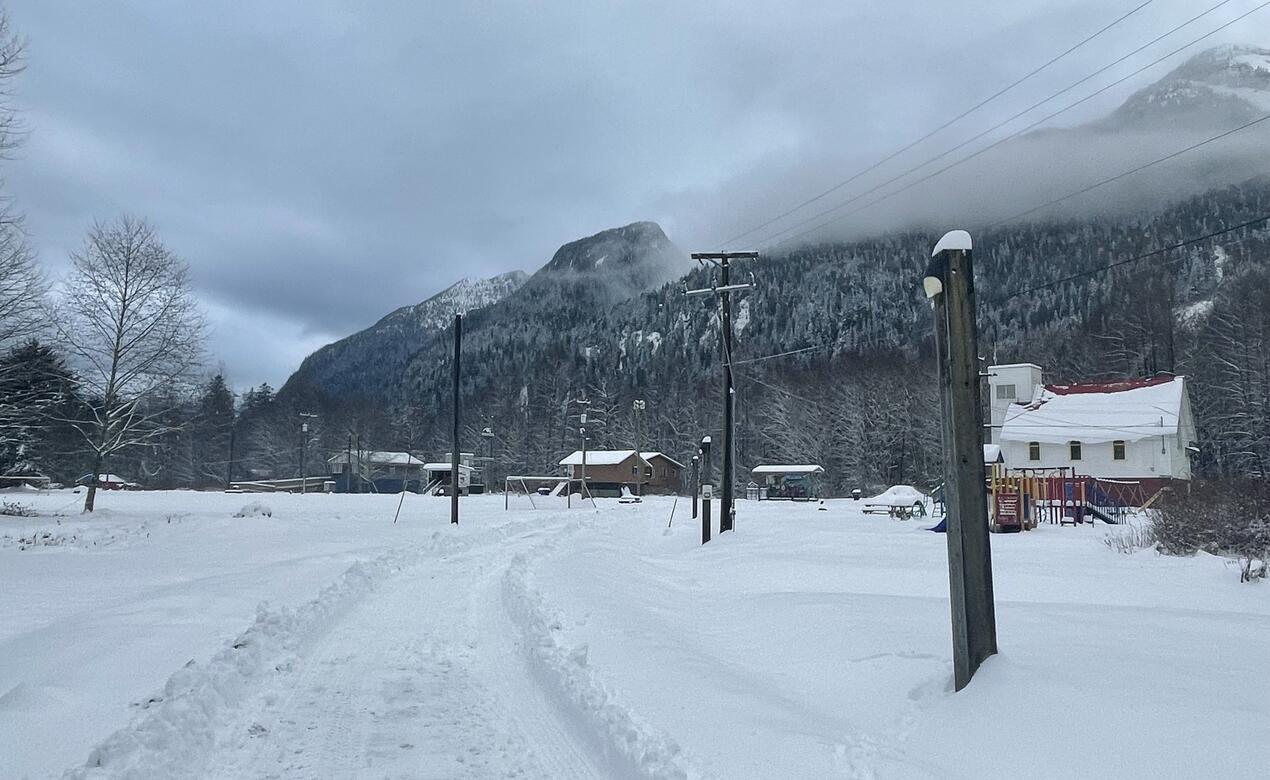
More commonly, youth can also opt to board with extended family or home stays in order to continue their education away from the community, which is what Alessandro did at first with a local public school in the Victoria area for Grade 10, but “realized pretty early on that this wasn't where I was going to stay. It was a lot of unregulated independence that I don’t know if I was ready for at 14 years old… I was ready to move on to better academics.”
“I started to research boarding schools in BC, and was looking for a school that offered a scholarship that was relevant to me and my interests, and that’s when I found SMUS. I saw that they had the Indigenous People Within Canada Award on their website and financial aid page, and that’s when I really started to pursue this school.”
“I felt like I was a good fit for the award because I’m engaged in a lot of Indigenous leadership. Every summer I go home and work in a student program, where you can do a variety of jobs within the community; Health Centre assistant, recreational worker organizing events in the summer, or a cultural worker interviewing elders and putting together articles, which is what I did last summer.”
He let Admissions know he was interested in the award, and went through the regular SMUS admission process before being interviewed for the scholarship. It took just two months from finding out about the award, to being offered it himself. “It really was life changing.”
Sharing Culture and Community
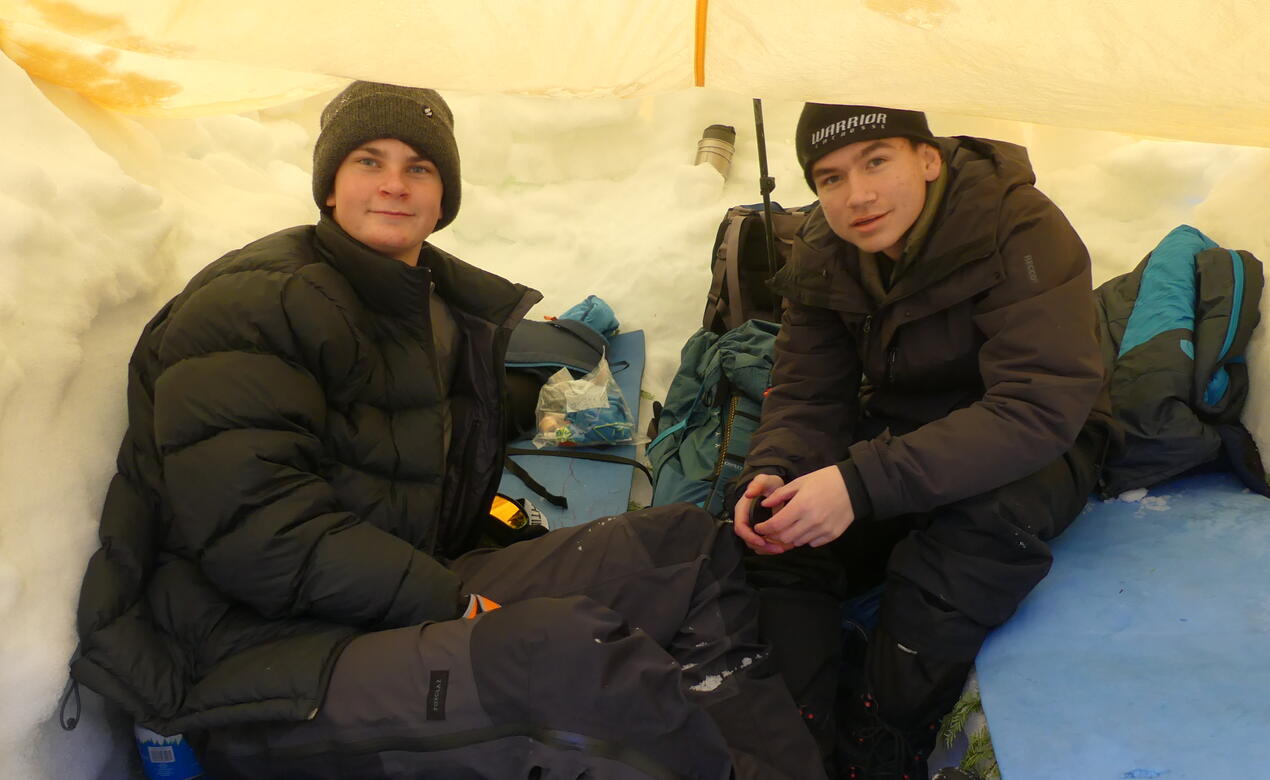
Arriving at SMUS in the fall of 2023 “was a pretty huge whirlwind, I was kind of in shock,” Alessandro chuckles. “Because I had come from such a small community, when you put my boarding house together, it adds up to be even more than the population back home. There was a lot of stuff going on constantly, but once I got into a really good routine, everything just settled down.”
“My parents’ biggest concerns were probably whether I’d be able to keep up academically and socially, having a roommate that they’ve never met… but when my mom came down for New Boarder Orientation and saw how many other new students were there and helped me set up my room, and getting constant updates from the houseparents, that helped alleviate those fears. It was a really good welcome to the school.”
A striking feature about SMUS, especially in the boarding community, is how diverse it is in culture and experiences. “My roommate is from Mexico; we both like our alone time, and share a lot of mutual friends and classes, so our routines are really similar. I was really nervous about being in a boarding house around so many people all the time, but it’s actually really nice to just have people walk into my room and start talking to me. I do like telling other people about my culture, my background, and what it's like to live in such a remote community.”
“One of the big meals we have a lot back home is wild salmon, rice, and seaweed. One day, Graves Hall made a dinner that tasted so much like it that I couldn’t believe it– just like something I would have in a potlatch. They had cooked the potatoes in a specific way that was just the same way we did back home. I immediately texted my family to tell them. It was pretty sweet.”
Becoming the Change in Education
Despite being away from home this year, Alessandro has continued to stay involved and make a difference in the Dzawada̱ʼenux̱w community. “In my free time at SMUS, I do a lot of genealogical work and family trees. It takes a lot of time and effort but it’s something that I do because it’s good to know who’s connected to who, and the history.”
More recently, the tracking of family history and cultural preservation brought him all the way to Colorado over Spring Break this year. “I went to Denver with my mother, my aunt, and a few other leaders in my community that were directing a mission to repatriate our regalia and items that were wrongfully taken. We’re working with a number of museums across North America and Europe to bring them back to the community, where they should be.”
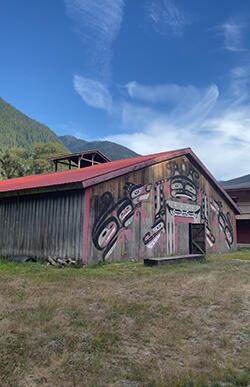
His passion for cultural preservation and representation is part of what fuels his goal of opening a boarding school back home. “I have an issue with the fact that so many students and families have to leave for school, and a lot of the time many students don’t come back to our community. I don’t want it to be a place where you just go visit, or where your grandparents are from. It’s where you’re from, too.” After going through the process himself, he realized that “this is something that I’m probably going to devote my whole life to working on. Someone has to do it.” Though still in Grade 11, his post-secondary sights are set on attending Queen’s University for their Indigenous Teacher Education Program (NITEP), in order to gain steps towards opening his school.
While at SMUS, Alessandro has also taken an active role in SMUS’s broader Indigenous initiatives and curriculum. “Since my focus is going to be in education, I like learning how to develop a school and improve it; I’ve been speaking with the Indigenous Liaison, and helping the English department with the new required English First Peoples course. It's nice to figure out how to develop a curriculum, and how to engage with youth similar to me, because that's something that I'm going to be doing when I eventually open my school.”
“None of this is a requirement from the recipient of the Indigenous Peoples Within Canada Award at SMUS,” he clarifies. “I choose to do it because I love public speaking, I enjoy being a leader and going up in front of 600 students and staff at assembly for Red Dress Day. I choose to participate in those things because I want to; as an Indigenous student, the school respects you, they won’t force you to take part in anything you don’t want to. I really want to emphasize that.”
Passing the Baton
As a relatively new scholarship at SMUS, many people do not know of it yet — or are aware that it is available to more than one student at a time. Alessandro is intent on spreading awareness of the scholarship, and the opportunities that it can provide to fellow Indigenous youth.
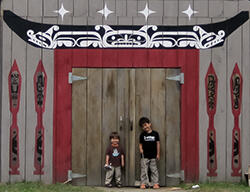
“Don’t feel afraid to apply because you’re Indigenous. It’s a wonderful opportunity, and if you’re ready to challenge yourself academically then you should definitely consider it. Not just for SMUS's academic reputation, but also for its environment. The faculty and students make an effort to be respectful of your background and where you come from. I feel really welcomed on campus.”
If you or someone you know are interested in applying for the Indigenous Peoples Within Canada Award, and identify as First Nations, Métis, and/or Inuit, please contact the Admissions office to learn more.



